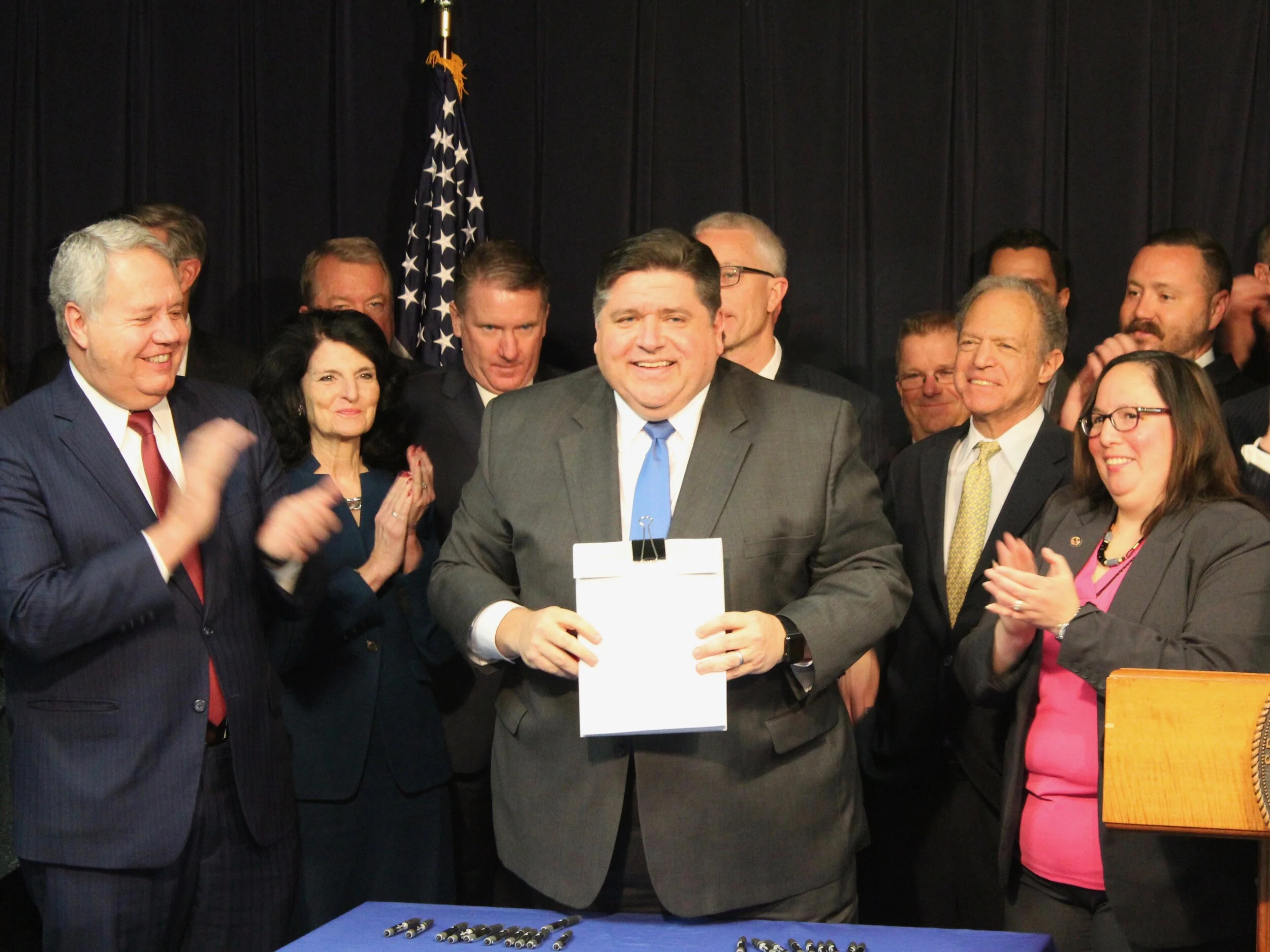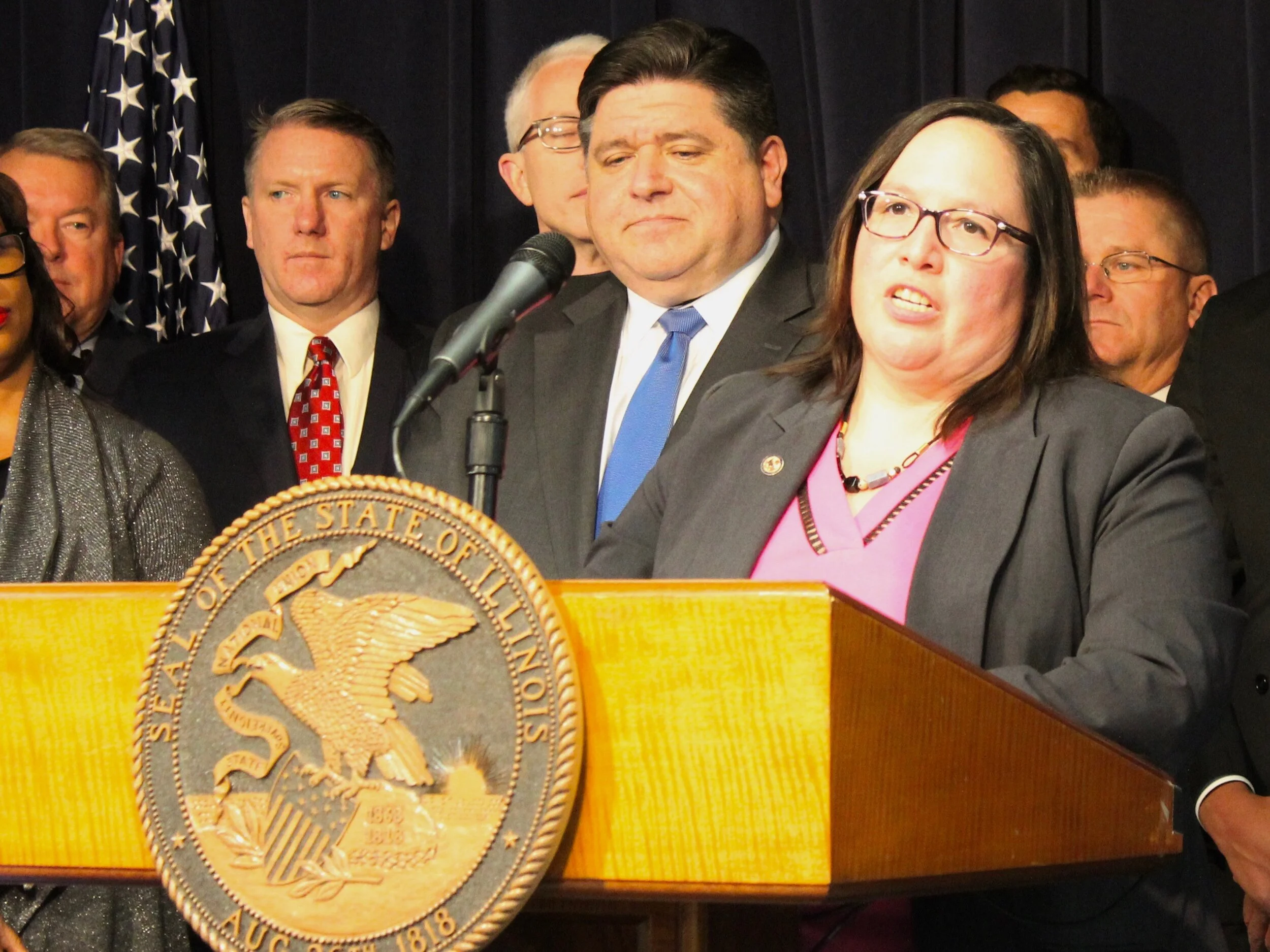Pritzker signs bill consolidating local pensions
Police, firefighters cheer ‘monumental’ first step on pension reform that should produce savings on property taxes
Flanked by lead sponsors Rep. Jay Hoffman and Sen. Cristina Castro and backed by members of the state pension task force and police and firefighter union heads, Gov. Pritzker brandishes the signed bill consolidating 649 local funds. (One Illinois/Ted Cox)
By Ted Cox
CHICAGO — Gov. Pritzker signed into law Wednesday a bill to consolidate 649 local police and firefighter pension funds into two — a move that should produce savings on administrative costs, gains in investment returns, and reductions in property taxes, while assuring those first responders a secure retirement.
“What we celebrate here today is monumental,” Pritzker said at the signing ceremony held in the Blue Room of the Thompson Center in Chicago. “One of the most critical long-term challenges that we face in Illinois is our underfunded local pension liabilities and the surging property-tax burdens that they create.”
The bill, originally put forth in October from a proposal submitted by the Pritzker-appointed Illinois Pension Consolidation Task Force, consolidates 649 local police and firefighter pension funds into just two. According to a news release put out by the Governor’s Office: “The new funds will leverage their collective buying power of $15 billion in assets – $8.7 billion in the police fund and $6.3 billion in the fire fund – to increase investment returns and lower management costs. Helping lower the pressure on local property taxes, the consolidation is estimated to produce greater returns of $820 million to $2.5 billion over the next five years alone and billions more over the next 20 years.”
“This is a single, reasonable, and common-sense solution to one of Illinois’s most pressing issues, accomplished in a way that is beneficial to all parties involved,” said state Sen. Cristina Castro of Elgin, one of the lead sponsors.
“
This is a single, reasonable, and common-sense solution to one of Illinois’s most pressing issues, accomplished in a way that is beneficial to all parties involved.”
Sen. Cristina Castro (One Illinois/Ted Cox)
“This consolidation also marks a vital step forward for our fiscal future,” Pritzker said. “It is evidence that we can tackle the most intractable problems of our state.
“My commitment to the people of Illinois is that I will always stand strong to make sure that we keep our promises to our retirees and that we will make our pension systems and our state’s finances stronger than they are today.”
Pritzker lauded lead sponsors Castro and state Rep. Jay Hoffman of Swansea for their bipartisan approach as well as the pension task force and the heads of the police and firefighter unions, but they in turn credited Pritzker’s leadership on the issue, as he appointed the commission almost immediately after taking office in January.
“This wasn’t easy. It was difficult,” Hoffman said. “It took the governor’s leadership, but it also took bipartisan effort in the House and the Senate.”
“The governor’s leadership was the catalyst that allowed this to happen,” said Bill Brodsky, chairman of Cedar Street Asset Management and one of the three chairpersons on the task force.
Associated Fire Fighters of Illinois President Pat Devaney said, “We had a governor in his 11th month in office who chose to be a leader and do things right and on behalf of working people like he’s done throughout this (legislative) session. So he’s adding this to the unprecedented list of things that he’s done for working people.”
Illinois Fraternal of Police Board Chairman Tim Kobler and Illinois Municipal League Executive Director Brad Cole joined in praising the pact.
Asked about conservative estimates that the reform addresses only 5 percent of the state’s overall pension problem, projected at more than $300 billion, Pritzker acknowledged, “There’s much more to do,” adding, “There are organizations in the state that just want to beat up on the state of Illinois, even though they live here, and not recognize that we all know there are challenges but we’re addressing them. Maybe they would like some silver-bullet, one-time solution to everything. It doesn’t exist. … We can’t get it all done at once.”
Pritzker said, “The work of this task force is not done.” He added it’s expected to tangle with answers to the state’s underfunded liability on pensions, as well as Chicago’s. “I believe that solutions and efficiencies can be found for all of these systems.”
Castro called Wednesday’s bill signing, which takes effect immediately, “the first step of fixing our state’s looming pension crisis. This by no means is the final step. But it’s a great place to get started.”
“As governor of the state, I don’t look at cities as if it’s some separate thing from what my responsibilities are,” Pritzker said. “I’m trying to lift up our cities, our towns, our villages all across the state, because I’m governor of all those people who live in those villages and towns and cities. Lowering their property taxes, finding ways to diminish the net pension liability over time for them, is just as much a part of what we do in state government as addressing the state pension system.”


